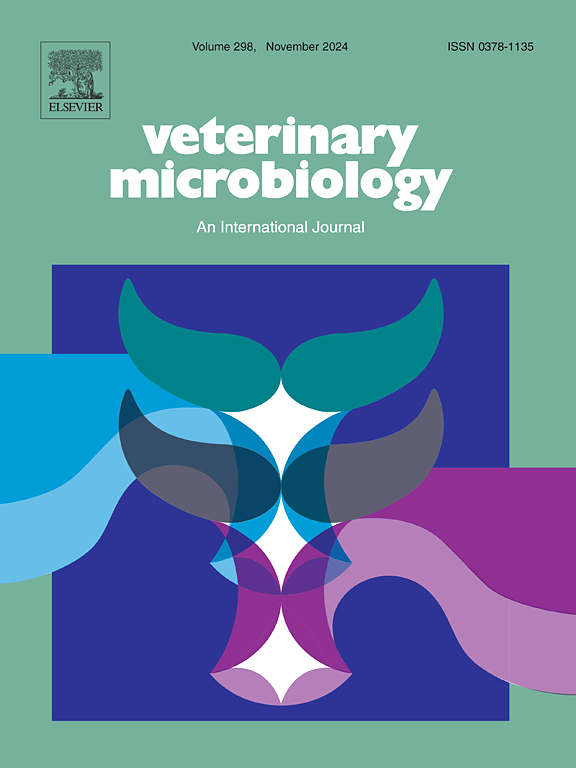Application and identification of monoclonal antibody targeting a novel epitope on p72 protein of African swine fever virus
IF 2.4
2区 农林科学
Q3 MICROBIOLOGY
引用次数: 0
Abstract
African swine fever (ASF) is a kind of disease caused by African swine fever virus (ASFV), which has a very high mortality rate for pigs. The p72 protein is the capsid protein of ASFV, which has good antigenicity and reactogenicity, and is suitable for serological detection of ASFV. In the study, a truncated N-terminal (1–224aa) p72 recombinant protein was expressed in Escherichia coli, and monoclonal antibody (mAbs) 2C3 and rabbit polyclonal antibody were generated. The epitope (160ITFALKPREEYQPSGH175) was recognized by epitope mapping to mAbs 2C3. The identified epitope was highly conserved among 25 ASFV strains by sequence alignment analysis, and located on the surface of p72 protein by 3D structural analysis. Based on mAbs 2C3 and rabbit polyclonal antibody, a double antibody sandwich ELISA detection method was developed. The results showed that the method had good specificity, high sensitivity and great potential for ASFV diagnosis.
非洲猪瘟病毒p72蛋白新表位单克隆抗体的应用与鉴定
非洲猪瘟(African swine fever, ASF)是一种由非洲猪瘟病毒(African swine fever virus, ASFV)引起的疾病,对猪有很高的死亡率。p72蛋白是ASFV的衣壳蛋白,具有良好的抗原性和反应原性,适合用于ASFV的血清学检测。本研究在大肠杆菌中表达了一个截断的n端(1-224aa) p72重组蛋白,获得了单克隆抗体(mAbs) 2C3和兔多克隆抗体。表位(160ITFALKPREEYQPSGH175)定位到单克隆抗体2C3。经序列比对分析,所鉴定的表位在25株ASFV株中高度保守;经三维结构分析,所鉴定的表位位于p72蛋白表面。以单克隆抗体2C3和兔多克隆抗体为基础,建立了双抗体夹心ELISA检测方法。结果表明,该方法特异性好,灵敏度高,对ASFV的诊断具有很大的潜力。
本文章由计算机程序翻译,如有差异,请以英文原文为准。
求助全文
约1分钟内获得全文
求助全文
来源期刊

Veterinary microbiology
农林科学-兽医学
CiteScore
5.90
自引率
6.10%
发文量
221
审稿时长
52 days
期刊介绍:
Veterinary Microbiology is concerned with microbial (bacterial, fungal, viral) diseases of domesticated vertebrate animals (livestock, companion animals, fur-bearing animals, game, poultry, fish) that supply food, other useful products or companionship. In addition, Microbial diseases of wild animals living in captivity, or as members of the feral fauna will also be considered if the infections are of interest because of their interrelation with humans (zoonoses) and/or domestic animals. Studies of antimicrobial resistance are also included, provided that the results represent a substantial advance in knowledge. Authors are strongly encouraged to read - prior to submission - the Editorials (''Scope or cope'' and ''Scope or cope II'') published previously in the journal. The Editors reserve the right to suggest submission to another journal for those papers which they feel would be more appropriate for consideration by that journal.
Original research papers of high quality and novelty on aspects of control, host response, molecular biology, pathogenesis, prevention, and treatment of microbial diseases of animals are published. Papers dealing primarily with immunology, epidemiology, molecular biology and antiviral or microbial agents will only be considered if they demonstrate a clear impact on a disease. Papers focusing solely on diagnostic techniques (such as another PCR protocol or ELISA) will not be published - focus should be on a microorganism and not on a particular technique. Papers only reporting microbial sequences, transcriptomics data, or proteomics data will not be considered unless the results represent a substantial advance in knowledge.
Drug trial papers will be considered if they have general application or significance. Papers on the identification of microorganisms will also be considered, but detailed taxonomic studies do not fall within the scope of the journal. Case reports will not be published, unless they have general application or contain novel aspects. Papers of geographically limited interest, which repeat what had been established elsewhere will not be considered. The readership of the journal is global.
 求助内容:
求助内容: 应助结果提醒方式:
应助结果提醒方式:


